
We're on the shores of Lake Tanganyka, an incredibly deep chunk of crystal touching Congo, Burundi, Tanzania and Zambia. It's one of those days when you lie down on a stone shaded by a palm tree, your face up towards the cloudless atmosphere, and feel your limbs and thoughts wandering off. You know it's just about time to get lost.

Bits and pieces of the road you've left behind reappear in front of your eyes as you close them, flashes of past actions, thoughts, traces. Trains of thoughts withouts verbs. The noises of Kampala disappearing behind us like the chattering of bugs behind thick walls. The dark of the night filled with the shreeking of monkeys and on the other side, our tent. Our orange personal little world, filled with everything we own, think, feel. That must be the reason for the air being so heavy you'd think.

Another flash, wide planes of cactus trees in the savannah bumping into faraway blue mountains, mirrored in a placid lake. A race against the sun to reach a safe place before dark, the wind slapping our faces on the backs of motorbikes. Steps through thick forest and muddy slopes and there we are again, Indiana Jones looking for treasures. Savage screams through the jungle, sad faces of black and white Colobous, courious faces of chimpanzees high up in the trees, probably just laughing at those strange humanoids who've come to see their butts hanging from branches ten meters high.
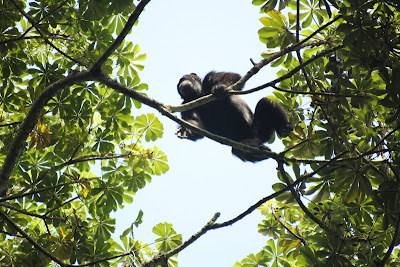
The sunrays are floating around on your face, pushed trough palm trees by the wind. You see the kind smile of Ali, pushing on the breaks of his ALLAH AKHBAR truck loaded with cement, stopping to pick you up. You can hear his muted fight with the gearstock though the eight hours ride to Kabale and his absolute certainty about goat meat being the best in the world.

There's Rwanda getting closer one morning and a you in the past crashing into a wall of fog. Bordercrossing at Katuna is a job for Houdini... And for Milton, the newspaper carrier who's been pendling for fifteen years, disappearing from the left hand side and appearing on the right in another country. The backdrop to the road from there to Kigali is an endless chain of green hills. We're au Pays des Milles Collines where French is just as much spoken as it is despised.
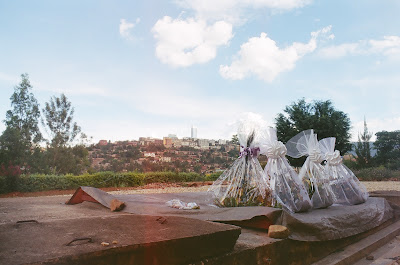
Kigali is anyway not what it looks like at first sight. She's not a widow mourning in silence, trying to hide a wound as deep as the sea or to attempting to forget. Kigali's wide awake and screaming, you can hear her through the shaking tears of schoolgirls at the Memorial Centre. Rwanda's scar is not rotten or hidden away, it's there for everyone to see in all its madness and horror. The tears don't show in a bold way, but people walk the streets of the capital, hand in hand with their ghosts. They've embraced them. Thoughts float back to Srebrenica in 2005. A haunted place, walls carved with bullets, empty buildings, broken windows. Broken widows. A black hole made of blood, still hanging over a city cursed with madness. We weren't there. We weren't here. I could read a million pages and still not understand. I could also write a thousand words without getting to explain. Kigali's kissed by the sunlight. She's alive and bearing the dead with her. Reality's surreal. But the Rwandaise have the strenght and really no other choice but to face the surreal truth, and remember. Day after day, guardians of their future.
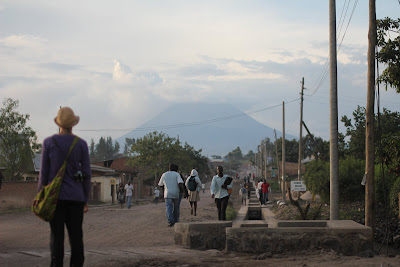
A flash and you're in Gisenyi, the dusty rwandaise pearl hidden deep inside a dynamite box. Metane gas in a blue lake, silent lava cooking in a volcano that glows shily at night. Congo is half a mile away, and women walk in a pictoresque line along the tarmac road, balancing on their heads baskets with tomatos and avocados bound for the border. Of Gisenyi you remember Kennedy, 21, Barcelona supporter, both parents killed in the genocide. What we've heard as a distant echo on the news as 7 and 8 years olds is his real life tragedy. Thinking about it makes you shiver, still he shrugs: "That's life. Life goes on". That is not how life should be, you want to reply. But who are you to say anything. In Gisenyi there's the local pub and the Manchester United - Barcelona match, the event of the year. A dark small room packed with rwandaise men is suddenly the sweaty, cosy center of the world. Everyone's standing up for their team, shouting and laughing. Chapter three of life outside the soap bubble, lived with those who look into the soap bubble through a TV screen.

Again, a flash. You're walking along a dark path at night, a billion stars sticking to a roof some light years away and shooting stars crossing the skies like fireworks. The morning sun rises to light up stunning volcanoes surrounding the small town of Kinigi. And you stare, you gape, you feel a calm ocean invading your veins. But as the packed bus leaves for Kigali, road hunger suddenly wakes up inside you. You know the traveling's also eating up your bones. You can hear the breaches cracking, mined by the distance from home, the shouting, the giggling, the stearing, the begging. By the cynism of others as well as your own. And you really need a dose of cynism to go on, still feeling the wonders of Africa penetrating your soul and giving you everything. You also need quite a dose of love to protect your horizon appetite. A hand to hold, to make sure you're safe. To make sure you're lost.
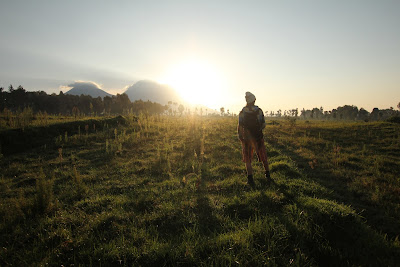


Fading images float around in your brain, more like paperboats than sailboats. You're now an acrobat, balancing on the borders to the heart of Africa, crawling into Burundi. Breathtaking views over mountains and hills, crowded and dusty villages, muddy streets, people walking on the side of the road carrying stuff three times their own weight, people begging and selling peanuts at busstops. You can feel the change of country on your skin when you cross a border by road. Still, nothing seems much different from the place you left behind.

"Bujumbura" is not a place on the map anymore. It's wrecked streets and amazing people. You're not in the capital city of Burundi. You're in the home and in the heart of people. Bujumbura is Lena, who opens a door and lets you into the story of a life lived in Norway, Mali, Uganda, Rwanda, Burundi. Lena works for Right to Play, smokes away the nerves after a death threat and knows what she's talking about when she speaks about Africa. Lord, Lena's honey, dreadlocks and strong opinions, boicotting the French as a whole and everything really. Torill, working for the Norwegian Refugee Council and her beloved Nils, opening their home for a night of coffee, cigarettes, beer and hilarious conversations. And Bujumbura is George, who will be a father in not too long and travel the world with a baby on his back. The night is vivid, surreal, heartwarming. You discuss crude pregnancy rituals involving slapping and pushing to encourage George in his soon-to-be fatherhood. You listen to the story of the bandit of Banda Island, who's been smuggling marijuana concealed in Zanzibar doors for export, than running a shady backpacker lodge at his secret island hideout on Lake Victoria. His days had by the way come to and end, Lord said.

After some beers George opens Pandora's Box of heated religious stuff. Why is it so difficult to talk about religion in Africa and what right have we got to take away illusions. Why is religion so successful and yeah, it must be because of the answers. It gives satisfying, positive answers to tiny questions such as what happens after we die. And you go on alking about death, and the horrible moment when, as a child, you discover that your life has an end. And do you really just go black and power out at the end? That can't be. It must be two or three o'clock when George talks about Buddhism, and how it's really not about whether there is a God or not, the big questions in life are about YOU. There is wine and four, five o'clock. Torill will leave Bujumbura soon, she and Nils will go to Congo. You talk more, you talk about nynorsk, couchsurfing and traveling through India with one change of clothes.
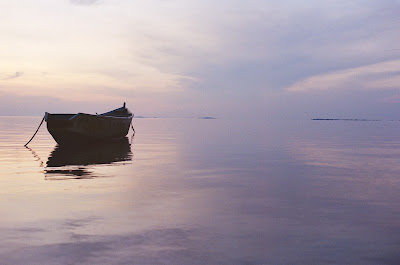
It gets light and Bujumbura is you, driving with George towards the beach as thousands of jogging people crowd the streets. It's seven a.m. and it's Sunday! Everything seems unreal. It might be the lack of sleep or the sun too bright, but it all just feels like a dream. George, whose sense of direction has been pulverized after being hit by a lightning, takes you to the calmest beach. As you dip your feet in lake Tanganiyka and look at the faded congolese mountains on the other side, you realize you'll never have words enough for what just happened. It's hard to swallow a croissant and a coffee when you're still trying to digest a whole night of shiny blue berries.

Another flash, before you really get the chance to start missing Bujumbura. A visa extension, an evening in a fishermen's village, another dusty, sweaty bordercrossing. You're in Kigoma, back where you started your trippy time machine head wanderings. You're under a palm tree and jumping off cliffs and rocks and watching the sun set, and the city of fishermen's lights at night. But that's another trip, I guess.

 We're on the shores of Lake Tanganyka, an incredibly deep chunk of crystal touching Congo, Burundi, Tanzania and Zambia. It's one of those days when you lie down on a stone shaded by a palm tree, your face up towards the cloudless atmosphere, and feel your limbs and thoughts wandering off. You know it's just about time to get lost.
We're on the shores of Lake Tanganyka, an incredibly deep chunk of crystal touching Congo, Burundi, Tanzania and Zambia. It's one of those days when you lie down on a stone shaded by a palm tree, your face up towards the cloudless atmosphere, and feel your limbs and thoughts wandering off. You know it's just about time to get lost. Bits and pieces of the road you've left behind reappear in front of your eyes as you close them, flashes of past actions, thoughts, traces. Trains of thoughts withouts verbs. The noises of Kampala disappearing behind us like the chattering of bugs behind thick walls. The dark of the night filled with the shreeking of monkeys and on the other side, our tent. Our orange personal little world, filled with everything we own, think, feel. That must be the reason for the air being so heavy you'd think.
Bits and pieces of the road you've left behind reappear in front of your eyes as you close them, flashes of past actions, thoughts, traces. Trains of thoughts withouts verbs. The noises of Kampala disappearing behind us like the chattering of bugs behind thick walls. The dark of the night filled with the shreeking of monkeys and on the other side, our tent. Our orange personal little world, filled with everything we own, think, feel. That must be the reason for the air being so heavy you'd think. Another flash, wide planes of cactus trees in the savannah bumping into faraway blue mountains, mirrored in a placid lake. A race against the sun to reach a safe place before dark, the wind slapping our faces on the backs of motorbikes. Steps through thick forest and muddy slopes and there we are again, Indiana Jones looking for treasures. Savage screams through the jungle, sad faces of black and white Colobous, courious faces of chimpanzees high up in the trees, probably just laughing at those strange humanoids who've come to see their butts hanging from branches ten meters high.
Another flash, wide planes of cactus trees in the savannah bumping into faraway blue mountains, mirrored in a placid lake. A race against the sun to reach a safe place before dark, the wind slapping our faces on the backs of motorbikes. Steps through thick forest and muddy slopes and there we are again, Indiana Jones looking for treasures. Savage screams through the jungle, sad faces of black and white Colobous, courious faces of chimpanzees high up in the trees, probably just laughing at those strange humanoids who've come to see their butts hanging from branches ten meters high. The sunrays are floating around on your face, pushed trough palm trees by the wind. You see the kind smile of Ali, pushing on the breaks of his ALLAH AKHBAR truck loaded with cement, stopping to pick you up. You can hear his muted fight with the gearstock though the eight hours ride to Kabale and his absolute certainty about goat meat being the best in the world.
The sunrays are floating around on your face, pushed trough palm trees by the wind. You see the kind smile of Ali, pushing on the breaks of his ALLAH AKHBAR truck loaded with cement, stopping to pick you up. You can hear his muted fight with the gearstock though the eight hours ride to Kabale and his absolute certainty about goat meat being the best in the world. There's Rwanda getting closer one morning and a you in the past crashing into a wall of fog. Bordercrossing at Katuna is a job for Houdini... And for Milton, the newspaper carrier who's been pendling for fifteen years, disappearing from the left hand side and appearing on the right in another country. The backdrop to the road from there to Kigali is an endless chain of green hills. We're au Pays des Milles Collines where French is just as much spoken as it is despised.
There's Rwanda getting closer one morning and a you in the past crashing into a wall of fog. Bordercrossing at Katuna is a job for Houdini... And for Milton, the newspaper carrier who's been pendling for fifteen years, disappearing from the left hand side and appearing on the right in another country. The backdrop to the road from there to Kigali is an endless chain of green hills. We're au Pays des Milles Collines where French is just as much spoken as it is despised. Kigali is anyway not what it looks like at first sight. She's not a widow mourning in silence, trying to hide a wound as deep as the sea or to attempting to forget. Kigali's wide awake and screaming, you can hear her through the shaking tears of schoolgirls at the Memorial Centre. Rwanda's scar is not rotten or hidden away, it's there for everyone to see in all its madness and horror. The tears don't show in a bold way, but people walk the streets of the capital, hand in hand with their ghosts. They've embraced them. Thoughts float back to Srebrenica in 2005. A haunted place, walls carved with bullets, empty buildings, broken windows. Broken widows. A black hole made of blood, still hanging over a city cursed with madness. We weren't there. We weren't here. I could read a million pages and still not understand. I could also write a thousand words without getting to explain. Kigali's kissed by the sunlight. She's alive and bearing the dead with her. Reality's surreal. But the Rwandaise have the strenght and really no other choice but to face the surreal truth, and remember. Day after day, guardians of their future.
Kigali is anyway not what it looks like at first sight. She's not a widow mourning in silence, trying to hide a wound as deep as the sea or to attempting to forget. Kigali's wide awake and screaming, you can hear her through the shaking tears of schoolgirls at the Memorial Centre. Rwanda's scar is not rotten or hidden away, it's there for everyone to see in all its madness and horror. The tears don't show in a bold way, but people walk the streets of the capital, hand in hand with their ghosts. They've embraced them. Thoughts float back to Srebrenica in 2005. A haunted place, walls carved with bullets, empty buildings, broken windows. Broken widows. A black hole made of blood, still hanging over a city cursed with madness. We weren't there. We weren't here. I could read a million pages and still not understand. I could also write a thousand words without getting to explain. Kigali's kissed by the sunlight. She's alive and bearing the dead with her. Reality's surreal. But the Rwandaise have the strenght and really no other choice but to face the surreal truth, and remember. Day after day, guardians of their future. A flash and you're in Gisenyi, the dusty rwandaise pearl hidden deep inside a dynamite box. Metane gas in a blue lake, silent lava cooking in a volcano that glows shily at night. Congo is half a mile away, and women walk in a pictoresque line along the tarmac road, balancing on their heads baskets with tomatos and avocados bound for the border. Of Gisenyi you remember Kennedy, 21, Barcelona supporter, both parents killed in the genocide. What we've heard as a distant echo on the news as 7 and 8 years olds is his real life tragedy. Thinking about it makes you shiver, still he shrugs: "That's life. Life goes on". That is not how life should be, you want to reply. But who are you to say anything. In Gisenyi there's the local pub and the Manchester United - Barcelona match, the event of the year. A dark small room packed with rwandaise men is suddenly the sweaty, cosy center of the world. Everyone's standing up for their team, shouting and laughing. Chapter three of life outside the soap bubble, lived with those who look into the soap bubble through a TV screen.
A flash and you're in Gisenyi, the dusty rwandaise pearl hidden deep inside a dynamite box. Metane gas in a blue lake, silent lava cooking in a volcano that glows shily at night. Congo is half a mile away, and women walk in a pictoresque line along the tarmac road, balancing on their heads baskets with tomatos and avocados bound for the border. Of Gisenyi you remember Kennedy, 21, Barcelona supporter, both parents killed in the genocide. What we've heard as a distant echo on the news as 7 and 8 years olds is his real life tragedy. Thinking about it makes you shiver, still he shrugs: "That's life. Life goes on". That is not how life should be, you want to reply. But who are you to say anything. In Gisenyi there's the local pub and the Manchester United - Barcelona match, the event of the year. A dark small room packed with rwandaise men is suddenly the sweaty, cosy center of the world. Everyone's standing up for their team, shouting and laughing. Chapter three of life outside the soap bubble, lived with those who look into the soap bubble through a TV screen. Again, a flash. You're walking along a dark path at night, a billion stars sticking to a roof some light years away and shooting stars crossing the skies like fireworks. The morning sun rises to light up stunning volcanoes surrounding the small town of Kinigi. And you stare, you gape, you feel a calm ocean invading your veins. But as the packed bus leaves for Kigali, road hunger suddenly wakes up inside you. You know the traveling's also eating up your bones. You can hear the breaches cracking, mined by the distance from home, the shouting, the giggling, the stearing, the begging. By the cynism of others as well as your own. And you really need a dose of cynism to go on, still feeling the wonders of Africa penetrating your soul and giving you everything. You also need quite a dose of love to protect your horizon appetite. A hand to hold, to make sure you're safe. To make sure you're lost.
Again, a flash. You're walking along a dark path at night, a billion stars sticking to a roof some light years away and shooting stars crossing the skies like fireworks. The morning sun rises to light up stunning volcanoes surrounding the small town of Kinigi. And you stare, you gape, you feel a calm ocean invading your veins. But as the packed bus leaves for Kigali, road hunger suddenly wakes up inside you. You know the traveling's also eating up your bones. You can hear the breaches cracking, mined by the distance from home, the shouting, the giggling, the stearing, the begging. By the cynism of others as well as your own. And you really need a dose of cynism to go on, still feeling the wonders of Africa penetrating your soul and giving you everything. You also need quite a dose of love to protect your horizon appetite. A hand to hold, to make sure you're safe. To make sure you're lost.

 Fading images float around in your brain, more like paperboats than sailboats. You're now an acrobat, balancing on the borders to the heart of Africa, crawling into Burundi. Breathtaking views over mountains and hills, crowded and dusty villages, muddy streets, people walking on the side of the road carrying stuff three times their own weight, people begging and selling peanuts at busstops. You can feel the change of country on your skin when you cross a border by road. Still, nothing seems much different from the place you left behind.
Fading images float around in your brain, more like paperboats than sailboats. You're now an acrobat, balancing on the borders to the heart of Africa, crawling into Burundi. Breathtaking views over mountains and hills, crowded and dusty villages, muddy streets, people walking on the side of the road carrying stuff three times their own weight, people begging and selling peanuts at busstops. You can feel the change of country on your skin when you cross a border by road. Still, nothing seems much different from the place you left behind. "Bujumbura" is not a place on the map anymore. It's wrecked streets and amazing people. You're not in the capital city of Burundi. You're in the home and in the heart of people. Bujumbura is Lena, who opens a door and lets you into the story of a life lived in Norway, Mali, Uganda, Rwanda, Burundi. Lena works for Right to Play, smokes away the nerves after a death threat and knows what she's talking about when she speaks about Africa. Lord, Lena's honey, dreadlocks and strong opinions, boicotting the French as a whole and everything really. Torill, working for the Norwegian Refugee Council and her beloved Nils, opening their home for a night of coffee, cigarettes, beer and hilarious conversations. And Bujumbura is George, who will be a father in not too long and travel the world with a baby on his back. The night is vivid, surreal, heartwarming. You discuss crude pregnancy rituals involving slapping and pushing to encourage George in his soon-to-be fatherhood. You listen to the story of the bandit of Banda Island, who's been smuggling marijuana concealed in Zanzibar doors for export, than running a shady backpacker lodge at his secret island hideout on Lake Victoria. His days had by the way come to and end, Lord said.
"Bujumbura" is not a place on the map anymore. It's wrecked streets and amazing people. You're not in the capital city of Burundi. You're in the home and in the heart of people. Bujumbura is Lena, who opens a door and lets you into the story of a life lived in Norway, Mali, Uganda, Rwanda, Burundi. Lena works for Right to Play, smokes away the nerves after a death threat and knows what she's talking about when she speaks about Africa. Lord, Lena's honey, dreadlocks and strong opinions, boicotting the French as a whole and everything really. Torill, working for the Norwegian Refugee Council and her beloved Nils, opening their home for a night of coffee, cigarettes, beer and hilarious conversations. And Bujumbura is George, who will be a father in not too long and travel the world with a baby on his back. The night is vivid, surreal, heartwarming. You discuss crude pregnancy rituals involving slapping and pushing to encourage George in his soon-to-be fatherhood. You listen to the story of the bandit of Banda Island, who's been smuggling marijuana concealed in Zanzibar doors for export, than running a shady backpacker lodge at his secret island hideout on Lake Victoria. His days had by the way come to and end, Lord said. After some beers George opens Pandora's Box of heated religious stuff. Why is it so difficult to talk about religion in Africa and what right have we got to take away illusions. Why is religion so successful and yeah, it must be because of the answers. It gives satisfying, positive answers to tiny questions such as what happens after we die. And you go on alking about death, and the horrible moment when, as a child, you discover that your life has an end. And do you really just go black and power out at the end? That can't be. It must be two or three o'clock when George talks about Buddhism, and how it's really not about whether there is a God or not, the big questions in life are about YOU. There is wine and four, five o'clock. Torill will leave Bujumbura soon, she and Nils will go to Congo. You talk more, you talk about nynorsk, couchsurfing and traveling through India with one change of clothes.
After some beers George opens Pandora's Box of heated religious stuff. Why is it so difficult to talk about religion in Africa and what right have we got to take away illusions. Why is religion so successful and yeah, it must be because of the answers. It gives satisfying, positive answers to tiny questions such as what happens after we die. And you go on alking about death, and the horrible moment when, as a child, you discover that your life has an end. And do you really just go black and power out at the end? That can't be. It must be two or three o'clock when George talks about Buddhism, and how it's really not about whether there is a God or not, the big questions in life are about YOU. There is wine and four, five o'clock. Torill will leave Bujumbura soon, she and Nils will go to Congo. You talk more, you talk about nynorsk, couchsurfing and traveling through India with one change of clothes. It gets light and Bujumbura is you, driving with George towards the beach as thousands of jogging people crowd the streets. It's seven a.m. and it's Sunday! Everything seems unreal. It might be the lack of sleep or the sun too bright, but it all just feels like a dream. George, whose sense of direction has been pulverized after being hit by a lightning, takes you to the calmest beach. As you dip your feet in lake Tanganiyka and look at the faded congolese mountains on the other side, you realize you'll never have words enough for what just happened. It's hard to swallow a croissant and a coffee when you're still trying to digest a whole night of shiny blue berries.
It gets light and Bujumbura is you, driving with George towards the beach as thousands of jogging people crowd the streets. It's seven a.m. and it's Sunday! Everything seems unreal. It might be the lack of sleep or the sun too bright, but it all just feels like a dream. George, whose sense of direction has been pulverized after being hit by a lightning, takes you to the calmest beach. As you dip your feet in lake Tanganiyka and look at the faded congolese mountains on the other side, you realize you'll never have words enough for what just happened. It's hard to swallow a croissant and a coffee when you're still trying to digest a whole night of shiny blue berries. Another flash, before you really get the chance to start missing Bujumbura. A visa extension, an evening in a fishermen's village, another dusty, sweaty bordercrossing. You're in Kigoma, back where you started your trippy time machine head wanderings. You're under a palm tree and jumping off cliffs and rocks and watching the sun set, and the city of fishermen's lights at night. But that's another trip, I guess.
Another flash, before you really get the chance to start missing Bujumbura. A visa extension, an evening in a fishermen's village, another dusty, sweaty bordercrossing. You're in Kigoma, back where you started your trippy time machine head wanderings. You're under a palm tree and jumping off cliffs and rocks and watching the sun set, and the city of fishermen's lights at night. But that's another trip, I guess.

Søte Mariapia vorres. Du er en fantastisk skribent og billedillustrator. Din historie tydeliggjør ytterpunkter fra det onde, absurde uforståelige til de bittesmå dagligdagse hendelser som gjør livet så spennende. Jeg har gjennom din historie vært med på en reise, en reise full av følelser, tanker og ny lærdom. Takk.
ReplyDeleteDet e mækti det dokker to grevlingan mine oppleve. Vaaaaaaaaaaaaaaaaaarm klem fra mams.